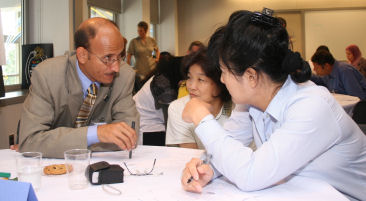State Department-backed program expands, gains respect in Middle East
 |
|
| Presenters from Egypt and Morocco shared teaching techniques with visiting teachers from Gyeonggi-do, South Korea, at their final conference in August. From left to right: Hassan Badr, Egypt; Kwang Hui Cho, and Jung Kyung Ohn, Korea. |
A teacher training program for educators from Middle Eastern and North African countries expanded to four countries this year, as English teachers from Egypt and Syria joined colleagues from Jordan and Morocco for six weeks of training in current methods of English language teaching.
Under the “Partnership for Learning” initiative funded by the U.S. Department of State, 41 educators spent six weeks in a series of professional development activities which included workshops, site visits and a final conference organized by the participants themselves.
The expanded program, supported through a $900,000 grant, joined teachers from Syria and Jordan from June 17 to July 30, and educators from Egypt and Morocco from July 7 to August 19. The two overlapping programs shared a common goal: expose participants to up-to-date approaches to language teaching and facilitate cultural understanding.
“The U.S. Department of State considers this to be one of their most important Middle Eastern professional development projects,” said project director Scott Stevens, “making a significant impact on each country’s capacity to teach English while also establishing critical cultural and professional linkages among our countries.”
This is the third year that ELI has hosted the State Department program. In 2004 and 2005 a total of 52 English teachers and teacher trainers from Jordan and Morocco participated.
Among this year’s participants was Dr. Suad Shaker, English language counselor at the Egyptian Ministry of Education in charge of English teacher training throughout Egypt.
“It really speaks to the success of the program that a high ranking official would take personal interest,” said Baerbel Schumacher, program coordinator.
In Morocco, the selection process for acceptance to the program is highly competitive, said Imane Karaman, a participant from Casablanca.
“In the 2006 program, 900 teachers applied for a dozen places,” she said.
In addition to attending workshops on various aspects of language pedagogy, this year teachers also observed summer school classes in the Christina School District and carried out brief teaching practicums in those classes. They paid a visit to a graduate course in UD’s Department of Education and engaged in a lively discussion about classroom management and student diversity. Later they had the chance to attend the day-long Summer Training Institute in Dover, sponsored by the State of Delaware’s Department of Education for teachers of English as a second language.
The program also focused on strengthening participants’ skills as trainers of other teachers, culminating in a two-day conference for each group, in which participants presented new teaching techniques.
“The conference sealed their own sense of themselves as capable of presenting to and sharing effectively with colleagues,” said Schumacher. These skills will prove useful in spring 2007, she said, when participants will be required to host a threeday follow-up conference to 50 fellow English teachers in their respective countries.
Throughout the six-week experience, opportunities abounded for participants to deepen their understanding of American culture and to share their own. In addition to living with an American family for two weeks, they visited a children’s summer camp, toured a senior center and played CDs of traditional music from their countries on WVUD, the university- run community radio station. In Washington, DC, they met representatives from the U.S. State Department Bureau of Educational and Cultural Affairs, as well as other government officials and representatives of private sector agencies.
“Most of my knowledge of American culture is from movies, and I had a distorted idea about what America is,” said Abdelaziz Dqaqi of Morocco. “When I came here I found a totally different people and country. I was really flattered by their politeness. This is the first thing I will circulate when I’m back home.”
Driss Lahleb of Morocco echoed this sentiment in his graduation address to the Egyptian and Moroccan group.
“I think that our role as teachers and the role of this kind of program is to clear us of all kinds of prejudice,” he said. “It is through language that we teach grammar, vocabulary and so forth, but it is also through language that we teach respect.”
The English Language Institute has received a $700,000 grant to continue the Partnership for Learning teacher training program in 2007.